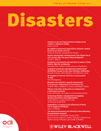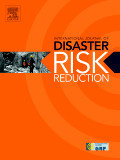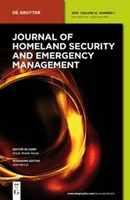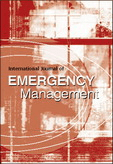
Progress in Disaster Science
Scope & Guideline
Transforming Knowledge into Action for Disaster Management
Introduction
Aims and Scopes
- Disaster Risk Assessment and Management:
The journal emphasizes the evaluation of risk factors and the development of management strategies to mitigate the impacts of disasters, including floods, earthquakes, and climate-related events. - Community Resilience and Preparedness:
Articles often explore how communities can enhance their resilience to disasters through preparedness strategies, awareness programs, and community-based approaches. - Interdisciplinary Approaches to Disaster Science:
The journal encourages interdisciplinary research that integrates insights from fields such as sociology, ecology, economics, and health to address the multifaceted nature of disasters. - Technological Innovations in Disaster Management:
There is a focus on the adoption of new technologies such as drones, AI, and GIS for improving disaster response, risk assessment, and recovery processes. - Policy and Governance in Disaster Risk Reduction:
The journal discusses the role of policies, governance frameworks, and institutional arrangements in shaping disaster risk management practices. - Vulnerability and Equity in Disaster Contexts:
Research often addresses the vulnerabilities of marginalized populations and the equity implications of disaster response and recovery efforts.
Trending and Emerging
- Climate Change and Disaster Interactions:
There is an increasing emphasis on understanding the interactions between climate change and disaster risks, particularly in terms of how climate variability exacerbates vulnerabilities. - Community-Based Approaches and Local Knowledge:
Emerging studies focus on integrating local knowledge and community engagement in disaster preparedness and recovery, recognizing the importance of grassroots involvement. - Technological Integration in Disaster Risk Reduction:
Research on the use of advanced technologies, including AI and remote sensing, for enhancing disaster management practices has surged, showcasing the potential for innovative solutions. - Mental Health and Psychosocial Impacts of Disasters:
An increasing number of papers are addressing the mental health implications of disasters, highlighting the need for psychosocial support in recovery efforts. - Systemic Risk and Compound Events:
The concept of systemic risk, particularly how multiple hazards can interact and compound disaster impacts, is gaining traction in recent publications. - Equity and Social Justice in Disaster Response:
There is a growing focus on social equity and justice in disaster management, examining how policies can better address the needs of vulnerable populations.
Declining or Waning
- Conventional Hazard Mitigation Techniques:
There has been a noticeable decline in research specifically focused on traditional hazard mitigation techniques, as newer, more integrated approaches gain traction. - Historical Case Studies of Disasters:
The journal has published fewer historical analyses of past disasters, indicating a shift towards contemporary issues and future-oriented research. - Single-Disaster Focus:
Research concentrating on individual disasters (e.g., focusing solely on earthquakes without considering multi-hazard contexts) has diminished, as the trend moves towards multi-hazard assessments.
Similar Journals

DISASTERS
Elevating disaster research to new heights since 1977.DISASTERS, published by WILEY, is a premier academic journal dedicated to advancing the understanding of disasters across multiple disciplines, including Earth and Planetary Sciences and Social Sciences. With a historical publication span from 1977 to 2024, this journal has established itself as a vital resource within the academic community, boasting a Q1 category ranking in both fields, indicating its high impact and relevance. DISASTERS ranks impressively in Scopus, holding the #27 position in General Social Sciences and #36 in General Earth and Planetary Sciences, reflecting its influence in shaping disaster research and policy. The journal serves as a platform for interdisciplinary collaboration, offering researchers, professionals, and students critical insights into disaster management, response strategies, and risk reduction measures. Although it is not an Open Access journal, DISASTERS remains a cornerstone for those looking to contribute to and stay informed about the evolving landscape of disaster studies.

International Journal of Disaster Risk Reduction
Elevating standards in disaster risk management and safety research.The International Journal of Disaster Risk Reduction is a leading academic publication dedicated to advancing the understanding and management of disaster risks, promoting innovative solutions and effective strategies for risk reduction. Published by ELSEVIER, this journal serves as a critical platform for researchers, professionals, and students in the fields of Geology, Geotechnical Engineering, and Safety Research. With an impressive impact factor and ranked in the top quartile (Q1) across its various categories as of 2023, it demonstrates exceptional quality and relevance in its contributions to science and engineering disciplines. The journal has been committed to disseminating high-quality research since its inception in 2012 and remains open for new submissions through 2024. The Scopus rankings reflect its prestigious position, with notable placements in Earth and Planetary Sciences and Social Sciences, highlighting its influence in shaping best practices for disaster risk governance. As an essential resource for anyone involved in disaster preparedness and mitigation, the International Journal of Disaster Risk Reduction fosters knowledge exchange and collaboration among stakeholders in the global community.

NATURAL HAZARDS
Pioneering insights into the science of natural hazards.NATURAL HAZARDS is a premier academic journal published by SPRINGER that focuses on the multidimensional aspects of natural hazards, their impacts, and mitigation strategies. With a robust impact factor and esteemed rankings in reputable databases such as Scopus, this journal is classified in the Q2 category in Atmospheric Science and Q1 in both Earth and Planetary Sciences (miscellaneous) and Water Science and Technology, showcasing its influence in these critical fields. Established in 1988 and continuing through 2024, it serves as a vital resource for researchers, professionals, and students alike, providing cutting-edge research and insights into the dynamics of natural hazards. Although it does not offer open-access options, the journal is accessible through institutional subscriptions, ensuring that high-quality research is disseminated efficiently to those dedicated to advancing our understanding of environmental challenges. By publishing empirical studies, theoretical analyses, and case studies, NATURAL HAZARDS plays a crucial role in informing disaster management policies and strategies, thereby contributing to a safer, more resilient world.

Bulletin of the New Zealand Society for Earthquake Engineering
Fostering knowledge for a resilient future against seismic challenges.Bulletin of the New Zealand Society for Earthquake Engineering (ISSN: 1174-9857, E-ISSN: 2324-1543) is a leading scholarly journal published by the New Zealand Society for Earthquake Engineering, Inc., dedicated to advancing the field of earthquake engineering. Since its inception in 1970, the journal has provided a vital platform for the dissemination of innovative research, technical studies, and case reports related to civil and structural engineering, as well as geotechnical engineering and engineering geology. Recognized for its significant contributions, the journal holds a Q2 ranking in both the Civil and Structural Engineering and Geotechnical Engineering and Engineering Geology categories as of 2023. It serves as an invaluable resource for researchers, professionals, and students keen on enhancing their understanding of earthquake resilience and engineering practices. While the journal operates under subscription-based access, its rigorous peer-review process ensures that published articles meet the highest academic standards, making it a credible source for the global engineering community.

Journal of Homeland Security and Emergency Management
Transforming Knowledge into Action for Emergency PreparednessJournal of Homeland Security and Emergency Management, published by Walter de Gruyter GmbH in Germany, is a leading platform for scholarly research dedicated to the critical fields of security and emergency management. With an impressive impact factor reflecting its high-quality publications, this journal plays an essential role in advancing knowledge within its scope that covers vital issues such as disaster preparedness, risk assessment, and organizational resilience. The journal's Scopus rankings highlight its distinguished standing, being in the top quartile for Safety Research and demonstrating significant impact across various fields including Business Management and Safety, Risk, Reliability, and Quality. Researchers, professionals, and students alike can access a wealth of information as this open-access journal from 2004 to 2024 is committed to disseminating critical insights and innovative practices essential for effective homeland security and emergency management strategies.

Urbe-Revista Brasileira de Gestao Urbana
Innovative Perspectives on Urban Planning and DevelopmentUrbe-Revista Brasileira de Gestão Urbana is a prominent academic journal dedicated to the field of urban management and development, published by the esteemed Pontificia Universidade Catolica do Paraná (PUCPR). This open-access journal, actively disseminating knowledge since 2009, focuses on advancing awareness and understanding of urban planning, architecture, and geographical issues in Brazil and beyond. With an impressive impact reflected in its 2023 quartile rankings—Q2 in Architecture, Q3 in Geography, Planning and Development, and Q3 in Urban Studies—Urbe serves as a vital platform for researchers and professionals alike. The journal strives to foster interdisciplinary dialogue and provide valuable insights into contemporary urban challenges, making it an essential resource for those engaged in the study and practice of urban management. Scholars can access it freely, enhancing its reach and relevance in an increasingly interconnected world.

Logistics-Basel
Connecting Ideas in Logistics and Operations ManagementLogistics-Basel, an esteemed academic journal published by MDPI, is a pivotal platform dedicated to advancing knowledge in the fields of logistics, supply chain management, and transportation. As a fully Open Access journal since 2017, it promotes the free dissemination of research findings, ensuring that crucial insights are accessible to a global audience. With its headquarters in Switzerland, the journal operates in a competitive landscape and has achieved significant recognition, evidenced by its Q2 ranking across multiple categories in the 2023 metrics, including Information Systems and Management, Management Science and Operations Research, and Transportation. The journal has been consistently contributing to its field since its inception, and its inclusion in esteemed databases like Scopus further highlights its relevance and impact. With an emphasis on fostering interdisciplinary research, Logistics-Basel serves as a vital resource for researchers, practitioners, and students alike, providing a forum for innovative studies that address contemporary challenges in logistics and operations.

International Journal of Emergency Management
Connecting scholars and practitioners to tackle critical emergency challenges.International Journal of Emergency Management is a reputable publication within the fields of emergency medicine and strategic management, published by InderScience Enterprises Ltd. With its ISSN 1471-4825 and E-ISSN 1741-5071, this journal has been a crucial platform for scholarly research since its inception in 2003. The journal aims to disseminate high-quality, peer-reviewed articles that address critical issues related to emergency management, including but not limited to disaster preparedness, response strategies, recovery methods, and risk assessment. Despite being categorized in Q4 of both emergency medicine and strategy and management in 2023, the journal serves as an essential resource for researchers, professionals, and students looking to further explore the evolving dynamics of emergency management. It leverages its global presence, with its headquarters located in the United Kingdom, thus attracting a diverse array of contributions addressing international and interdisciplinary perspectives. The journal fosters an environment where innovative ideas can flourish, ultimately contributing towards enhancing global emergency management practices.

Geofizika
Advancing Geophysical Knowledge for AllGeofizika, an esteemed journal published by the Andrija Mohorovičić Geophysical Institute at the University of Zagreb, presents a significant platform for research in the fields of geophysics and Earth sciences. With an Open Access model established since 1984, this journal ensures that scientific knowledge is accessible to a broad audience, encouraging collaborations and the free exchange of ideas. Geofizika has steadily evolved through its converging years from 1989 to 1999 and has been active from 2003 to the present, reflecting its commitment to advancing geophysical research. The journal has been recognized for its contributions to Earth and Planetary Sciences and has acquired respectable ranks in various categories; notably, it holds a Q4 status in Geophysics as of 2023. Researchers, professionals, and students will find Geofizika a valuable resource for the latest discoveries and methodologies in geophysics, supporting the academic community in expanding the frontiers of knowledge in these vital scientific domains.

Geoenvironmental Disasters
Exploring the intersection of environment and engineering.Geoenvironmental Disasters, published by SPRINGERNATURE, is a leading open-access journal dedicated to advancing the interdisciplinary fields of environmental science, geography, and geotechnical engineering. Since its inception in 2014, the journal has made significant strides in disseminating high-quality research that addresses the challenges posed by geoenvironmental hazards and their impacts on society. With an impressive Q1 ranking across multiple categories, including Environmental Science (miscellaneous) and Geography, Planning and Development, it occupies a vital niche within the academic community. The journal’s rigorous peer-review process ensures that only the most insightful contributions are made available to a global audience. Researchers, professionals, and students are encouraged to engage with the content, which covers a wide range of topics, including disaster management, risk assessment, and stakeholder engagement in policy-making. This commitment to open-access accessibility since 2014 further enhances its reach and impact, providing a critical platform for advancing knowledge and innovation in managing geoenvironmental disasters.